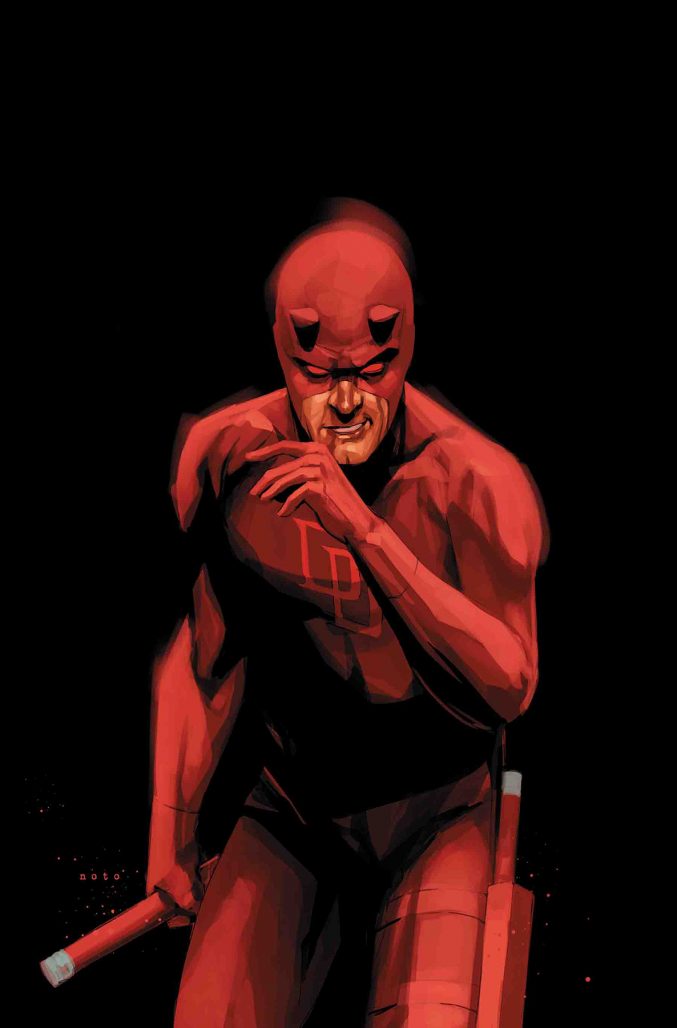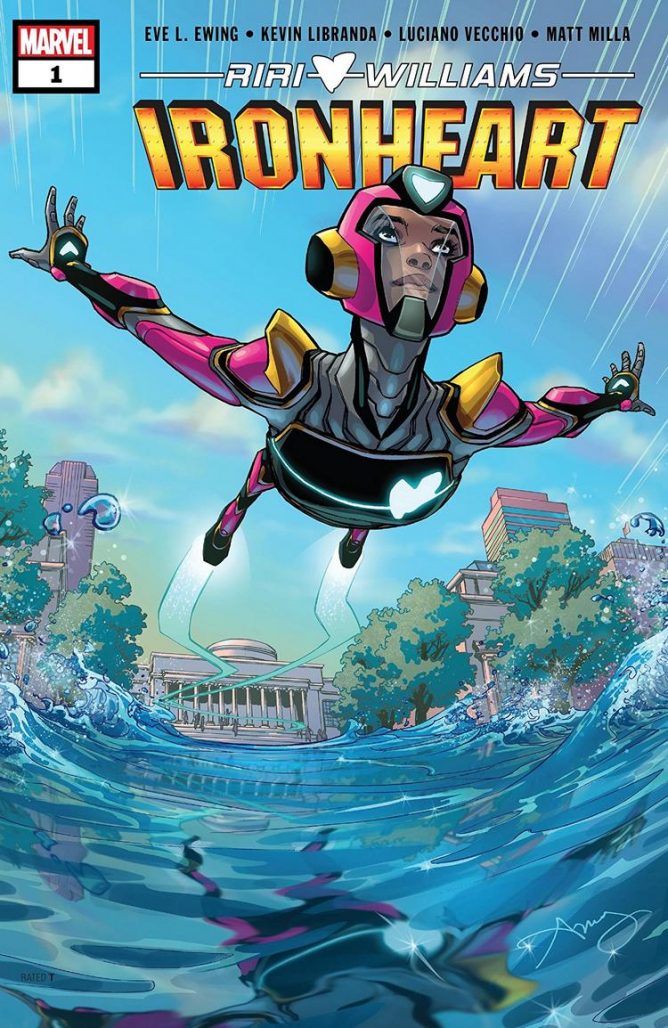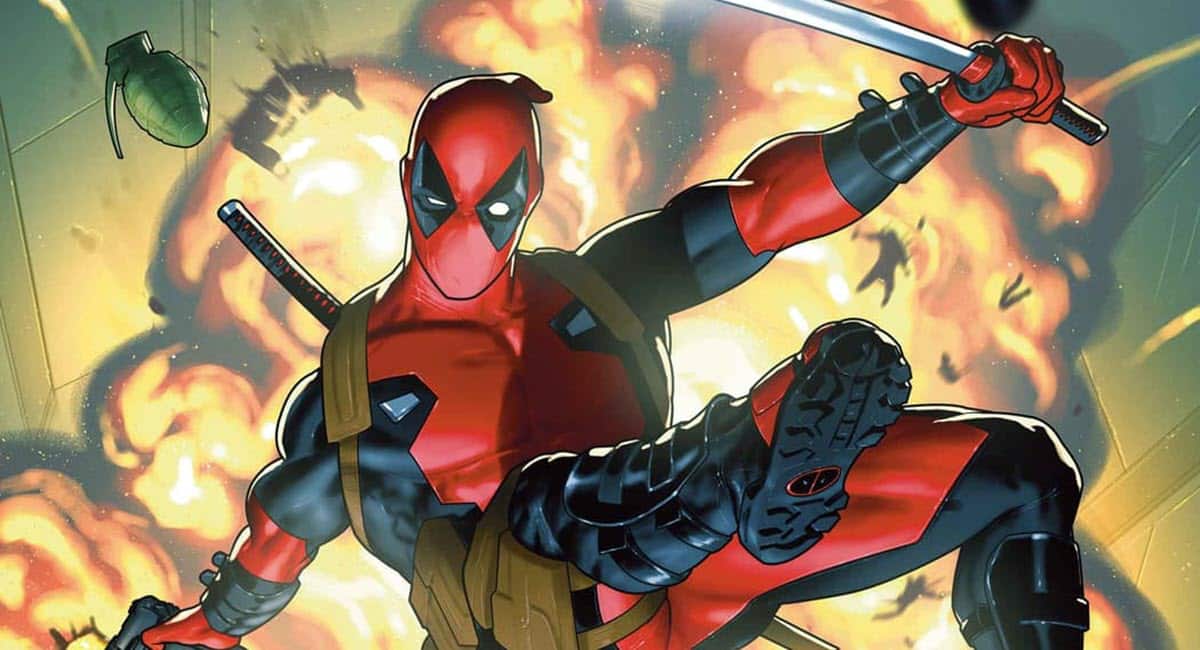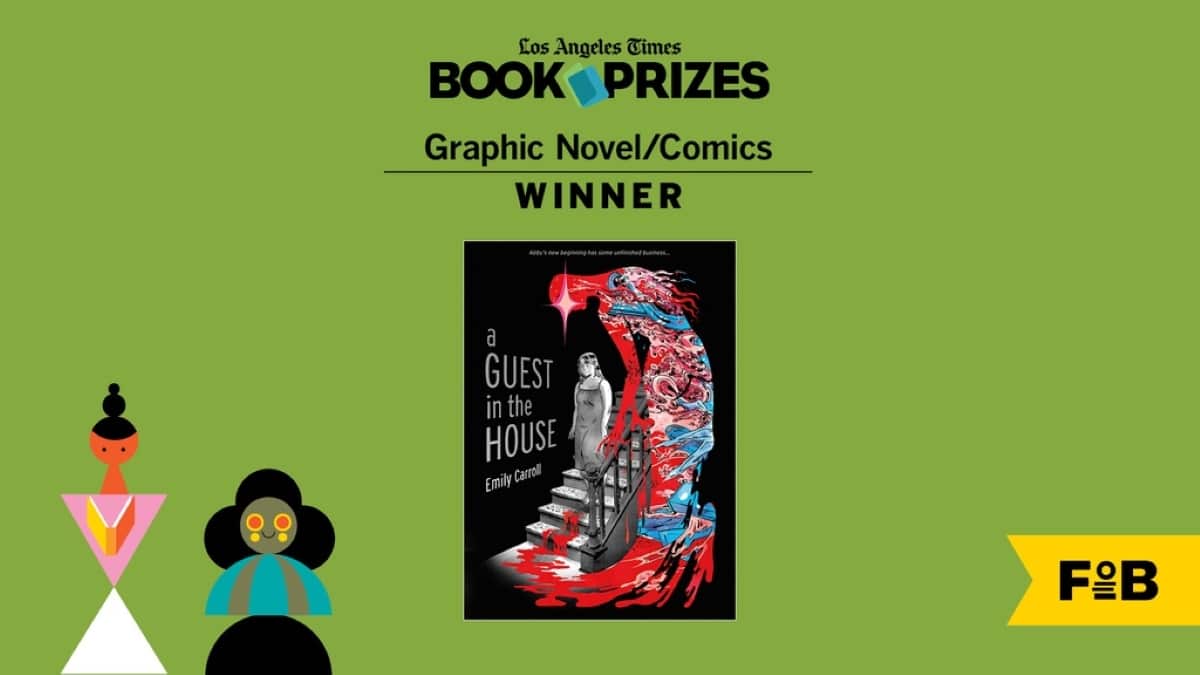Marvel is capping off a long-running series starring a core hero this week with Daredevil #612. The arc’s tantalizing title, “The Death of Daredevil,” is teasing a huge storyline, and we’re here to report if the comic lives up to its name. Plus, Riri Williams is back in her own ongoing series with the debut of Ironheart, written by acclaimed author Eve Ewing. Do not miss this busy week on The Marvel Rundown!
 Daredevil #612
Daredevil #612
Written by Charles Soule
Illustrated by Phil Noto
Lettered by VC’s Clayton Cowles
Reviewed by Alexander Jones
Writers have tried to pull fake-out deaths for years. Daredevil #612 is the best kind of death storyline that will leave readers scratching their heads with delight until the upcoming reboot. Author Charles Soule has so many storylines from previous issues that were left unresolved. Instead of wrapping up each one, Soule leaves his Daredevil plot threads open-ended. In the world of superhero comics, writers are often pressured to put a perfect, neat ending on the resolution of their story. Most writers return the status quo of the character back to the point where they received them in the final moments. In fact, previous Daredevil writer Mark Waid handed off the character after he had written Matthew Murdock a perfectly happy ending. Getting the chance to see Soule continue the tradition of putting Murdock through the hard-boiled nature of Hell’s Kitchen even took some convincing. Thankfully, the fruits of Soule’s labor have come to pass in this incredibly gritty issue checking in on some of the darkest aspects of the run to date.
Artist Phil Noto is a great choice to illustrate the script. Noto’s realistic, nuanced art is perfect for the sobering nature of Daredevil. The courtroom scenes in the issue in particular are perfectly suited for the easy-going watercolor penciled scenes from Noto. The surreal script and nature of ‘The Death of Daredevil’ is geared towards Noto’s artistic talents. A double-page spread featuring an abundance of heroes in a more casual setting is one of the best use of Noto’s talents I have seen in the past couple of years. Even the most casual scenes in the issue have some sort of interesting framing or aspects to look at. Kingpin has a splash page where his proportions and demeanor make him an incredibly imposing figure.
Daredevil #612 is a polarizing reading experience geared entirely towards the final reveal of the issue. However, a storyline willing to take such a monumental chance at a publisher like Marvel is a really bold move. Soule also takes the time to explain what is happening in the story without giving readers too much information or really explaining the status quo in detail. In fact, after closing the page on the final issue readers are tempted to go through the story and read the chapter again from the first page. It is also slightly disheartening that Soule didn’t get the chance to resolve the plot lines involving intriguing characters like Mike Murdock. With the announcement of another Daredevil comic from Chip Zdarsky and Marco Checchetto on the way, I hope some of these plot threads will be picked up there.
The bad news is that even after their finale Soule and Noto hardly feel finished with The Man Without Fear but have to move on anyway. For a story that had a tough job at making some kind of finality and last statement on the character in a really short amount of time, Soule did an excellent job pulling the rug out from underneath readers at the last minute. While this storyline definitely serves as more of a figurative death for Daredevil rather than a literal one, it does serve as a worthy conclusion to a creative Daredevil run. I hope Zdarsky and Checchetto pick up right where Soule and Noto left off in the new run.
Final Verdict: For anyone invested in the Soule run or the character of Matthew Murdock I don’t have any hesitation awarding the issue a BUY verdict.
 Ironheart #1
Ironheart #1
Written by Eve Ewing
Illustrated by Kevin Libranda and Luciano Vecchio
Colored by Matt Milla
Additional Layouts by Geoffo
Lettered by VC’s Clayton Cowles
Alexander Jones: One of Marvel’s newest heroes, Ironheart, is getting a new lease on life with a brand new ongoing series. The title is by new comic book writer and esteemed literary talent Eve Ewing and artists Kevin Libranda and Luciano Vecchio. Gentlemen, do the creative team find a way to make Riri Williams work outside of the context of her original creators?
AJ Frost: Like anything that is Ironheart-related, everything about this book was fine, but not stellar. The message was good, the action was good, the story was pretty on-par with anything “Iron”-related (lots of tech jargon and interactive armor). But, for whatever reason, I just didn’t engage fully with this story. Again, it wasn’t bad. Maybe just inoffensive and bland. What did you think, Joe?
Joe Grunenwald: I actually really enjoyed this comic. I don’t have a ton of experience with Riri before reading this, so I came into it pretty fresh, and I thought Ewing did a nice job of introducing the character and giving us a feel for her personality. I agree that the overall story was pretty cut-and-dry as far as superhero adventures go, but I was enjoying the character enough that it didn’t bother me. This is a very good debut issue.
Frost: I’ve always liked Riri as a concept more than the character we see on the page. That might be more about my biases and preconceived notions, though.
Jones: I like the idea of Ironheart and Riri Williams and Eve Ewing and Kevin Libranda, but the execution is where the concept comes apart for me. For a storyline so focused on the internal monologue and inner nature of Williams, Ewing’s script fumbled to find any sort of driving momentum. This issue reminded me of Ironheart creator Brian Michael Bendis’s last couple of scripts at Marvel in how the book was unable to find a reason to exist. This is a particular shame because Marvel has so many books like this that they are publishing.
Frost: Yeah, there was a lot of extra padding here for seemingly no reason. This could have been a taut twenty-two pages of action and emotion. Instead, lots of pages wasted describing certain technical things that distracted from the core of the story. Not that it was all bad. When Ewing is writing the slower moments, she really shines. But when she has to deal with the abstractions of the superhero concept, it all gets rather dull.
Grunenwald: I can see what you gents are saying, but I still disagree. I thought the description of the technical elements of the story provided a nice insight into Riri as a character, since that’s all stuff that’s running through her head. The structure of the issue did feel like it dragged a bit toward the end, but I think that may be a product of the type of story that Ewing is telling. She seems to be less interested in Riri as a superhero and more as just a person who’s trying to make sense of a life filled with tragedy. (Who happens to be a superhero from time to time.)
Frost: I mean, sure, that’s one way of looking at it. But why waste so much time with it? Make it a frame and then move on. It just sorta lingers and drags everything else down.
Jones: Joe, what about the characterization from Ewing’s depiction of Williams stood out to you? I definitely agree with AJ in that the issue did not have 30 pages of story to tell.
Grunenwald: I don’t disagree that the overall story could’ve been tightened up. I liked Riri in contrast to a character like Tony Stark. Stark is a genius, but he’s also charismatic, always has a snappy line or comeback. Riri, on the other hand, is a little more awkward, a little more aloof. She doesn’t quite know how to communicate with people, and people don’t really know how to talk to her, either. The series of panels where the foreign dignitaries are asking her about things really exemplifies this for me. Even when she’s in the field as Ironheart, fighting with Clash, she still seems uncomfortable with being a superhero. I really liked that.
Frost: That awkwardness is fine. But Ewing just goes back to it over and over again, as if we readers didn’t get the point. But then again, Peter Parker has been awkward for about fifty years, so it’s all a matter of perspective.
Jones: I agree with what AJ is saying. While it is nice to get a character who is a little more reserved and personal, I didn’t feel the emotional connection to Riri that I wanted to from Ewing’s script. These newer characters have an untapped potential and I have been waiting in particular for Riri to break out but the idea of the character has always trumped the execution. From a scripting perspective, I think this issue really falters. There’s no forward momentum or agency for Riri and she doesn’t get to define herself as a character. I do think that Kevin Libranda and Luciano Vecchio really stepped up to the plate and delivered beautifully expressive art that was worthy of Riri’s greatness.
Grunenwald: I enjoyed the art from both Libranda and Vecchio. Their styles are similar enough that I didn’t even notice the transition between them.
Frost: The Ironheart design was good and there were some lovely action sequences. But I can’t say anything stood out particularly for me.
Grunenwald: (I actually kind of think the design of the Ironheart armor is hideous, but neither of these artists designed it, so what’re you gonna do.)
Jones: It is great to see Marvel fostering some new talent. Both creators have a great handle on expression and the transition between Libranda and Vecchio was seamless as you had mentioned earlier, Joe. The more time goes by the more okay I am with the redesigned armor but I think it was definitely better-looking before.
Grunenwald: They made it look better than I’ve seen it before, to be fair.
Frost: I guess the thing with the Ironheart armor is that they could redesign it and claim its some nano-tech or something and get away with it. I don’t know. Ironheart’s design is fine, but it doesn’t inspire much. For what it is, it is perfectly acceptable. But it is not going to sell books based on the armor alone.
Jones: Agreed. At the end of the day, it is difficult for me to say anything positive about the title from a scripting perspective. This issue should have not meandered aimlessly for nearly the full run time. The cliffhanger is also really weak and not enough to get readers to come back next month. Ewing’s dialogue and captions did not allow for me to forge the connection with this character that I want to have. If Riri is an important part of the Marvel Universe at this moment in time, I’m having a difficult time discerning why based on this issue alone.
Grunenwald: Why does she have to be an important part of the Marvel Universe? Why can’t she just be an interesting character?
Frost: But I’m not sure if she is that interesting a character. Maybe not yet. I’ll go back to my feeling that the idea of Ironheart has been more important than the execution. Maybe this issue is just a testing ground before Ewing gets a better sense of the character and takes her to fantastic new heights.
Jones: Right. There needs to be something about her characterization that sets her apart from the other younger heroes.
Grunenwald: Maybe I’m cutting Ewing some slack since this is her first comic script. I don’t think I am but maybe I am. I thought this book was entertaining and I’ll definitely read more of it.
Frost: Alright then, lads. What’s the verdict on young Riri here?
Grunenwald: Pretty sure I’m the odd man out on this but I’m giving it a STRONG BROWSE. It’s not a perfect issue, but I thought it was pretty enjoyable, and I like the way Riri is presented here.
Jones: I wanted to like this but it did not elicit any emotion from me. The story was pleasant and the art from Libranda and Vecchio was really solid. I’m still going to have to give this debut a SKIP with the asterisk that I want to see these newer creators and this character do good work in the future.
Frost: I’m indifferent to it. I’ll take a middle position here: BROWSE.
Final Verdict: Joe says STRONG BROWSE, Alexander says SKIP, AJ says BROWSE.
Join us next week as the Hulk and Namor strive to defend the Marvel Universe!











